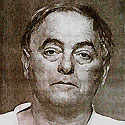By Marie Rohde
Milwaukee Journal Sentinel
July 16, 2008
http://www.jsonline.com/story/index.aspx?id=773497
The state Supreme Court on Wednesday upheld the dismissal of a lawsuit against two Catholic dioceses, ruling that the Madison Diocese did not have a broad duty to warn potential future employers of a teacher’s past sexual abuse of children.
However, the court split 3-3 on whether to let the suit proceed against the Archdiocese of Milwaukee, where church officials had begged parents not to report the teacher to police and promised he would be sent for treatment and not allowed to have contact with children. The tie affirms the decision to dismiss the case against the archdiocese.
The suit had been filed by five men who were victimized as children at a Catholic school in Kentucky by a teacher after he had committed similar abuses in Wisconsin in the 1960s.
 |
| Kazmarek |
The court did not decide two key issues: Whether the church has immunity from lawsuits under the First Amendment protection guarding the practice of religion and whether the statute of limitations prevents such claims to be litigated decades after the abuse, said Marcie Hamilton, a New York lawyer who argued the case for the plaintiffs.
“This is a very narrow decision,” Hamilton said. “It’s a rare case that will not have broad application.”
In the case against the Madison Diocese, the high court found that the victims failed to show the church was negligent, and that even if they had shown negligence, the court would have denied liability on public policy grounds.
“There is no state in which employers are recognized as being negligent for failing to seek out, find, and warn future employers of sexually dangerous former employees,” writes Justice Louis Butler in a 28-page decision joined by five other justices.
The plaintiffs said they were abused between 1968 and 1973 at a Kentucky Catholic grade school by Gary Kazmarek, after he was forced out of Wisconsin because of similar complaints. They were suing the two Wisconsin dioceses and their insurers, saying they had failed to warn others of Kazmarek’s possible danger.
Claims of sexual abuse were brought to the attention of the Archdiocese of Milwaukee long before Kazmarek went to Kentucky. Church officials promised two dozen of the victims’ parents “that Kazmarek would be sent to a treatment center and that he would never have contact with children again,” according to the complaint, and “pleaded with parents to not report Kazmarek’s crimes to the police.” Instead, he was allowed to leave Milwaukee quietly and work in other schools.
Kazmarek admitted sexually abusing up to 10 more children at St. Bernard School in the Madison Diocese, but there was no evidence that church officials there made similar promises to parents when the abuse came to light, the decision noted. He was ultimately convicted in Kentucky of abusing five former students and sentenced to 13 years in prison in 2004.
Claim too broad
Everyone in the state has a “duty to act with reasonable and ordinary care under the circumstances,” the court says, but adds that the diocese’s mere knowledge of the past sexual abuse and Kazmarek’s propensity for future abuse doesn’t require officials to notify all potential employers in parochial schools around the country.
The opinion notes that plaintiffs never alleged that diocesan officials in Madison recommended Kazmarek to the Archdiocese of Louisville, had any communication with them about Kazmarek or even knew Kazmarek was in Kentucky working with children.
Butler noted that it is critical that sexual abuse victims receive full justice through criminal and civil laws to the extent legally possible, and that the plaintiffs had been compensated through a separate settlement with the Archdiocese of Louisville.
Peter Isely, a spokesman for SNAP, a group of survivors of church sexual abuse, called Butler’s comment about justice for victims “a powerful plea” directed at the Wisconsin Legislature to pass a law that would enable victims to sue the church.
In Wisconsin, two earlier decisions prevent victims from suing the church. The high court opened the door a bit in 2007 when it ruled unanimously that the church could be sued for fraud if it knowingly placed priests with records of sexually abusing minors in parishes without alerting the congregation or others to the danger.
Tie vote on Milwaukee
Justices Shirley Abrahamson, Ann Walsh Bradley and Butler wanted to reverse the appellate decision and allow the case against the Milwaukee Archdiocese to proceed. Justices N. Patrick Crooks, Patience D. Roggensack and Annette K. Ziegler agreed with the appeals court that the case should be dismissed because it was not filed within three years of the last assault. The plaintiffs argued that they didn’t learn of the Wisconsin dioceses’ prior knowledge of Kazmarek until 2002, and they sued in 2005.
Justice David Prosser, a former prosecutor who handled cases of sexual abuse involving the Catholic Church, did not participate in the case.
The lower court’s dismissal was affirmed without further analysis.
Contact: mrohde@journalsentinel.com
Any original material on these pages is copyright © BishopAccountability.org 2004. Reproduce freely with attribution.